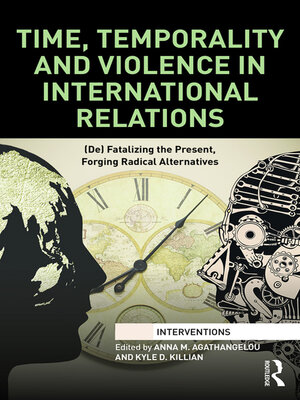Time, Temporality and Violence in International Relations
ebook ∣ (De)fatalizing the Present, Forging Radical Alternatives · Interventions
By Anna Agathangelou

Sign up to save your library
With an OverDrive account, you can save your favorite libraries for at-a-glance information about availability. Find out more about OverDrive accounts.
Find this title in Libby, the library reading app by OverDrive.



Search for a digital library with this title
Title found at these libraries:
| Library Name | Distance |
|---|---|
| Loading... |
Time transforms the way we see world politics and insinuates itself into the ways we act. In this groundbreaking volume, Agathangelou and Killian bring together scholars from a range of disciplines to tackle time and temporality in international relations. The authors – critical theorists, artists, and poets – theorize and speak from the vantage point of the anticolonial, postcolonial, and decolonial event. They investigate an array of experiences and structures of violence – oppression, neocolonization, slavery, war, poverty and exploitation – focusing on the tensions produced by histories of slavery and colonization and disrupting dominant modes of how we understand present times.
This edited volume takes IR in a new direction, defatalizing the ways in which we think about dominant narratives of violence, 'peace' and 'liberation', and renewing what it means to decolonize today's world. It challenges us to confront violence and suffering and articulates another way to think the world, arguing for an understanding of the 'present' as a vulnerable space through which radically different temporal experiences appear. And it calls for a disruption of the "everyday politics of expediency" in the guise of neoliberalism and security.
This volume reorients the ethical and political assumptions that affectively, imaginatively, and practically captivate us, simultaneously unsettling the familiar, but dubious, promises of a modernity that decimates political life. Re-animating an international political, the authors evoke people's struggles and movements that are neither about redemption nor erasure, but a suspension of time for radical new beginnings.







